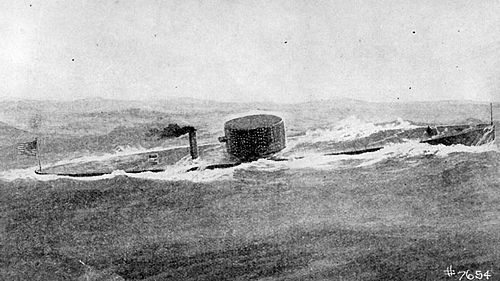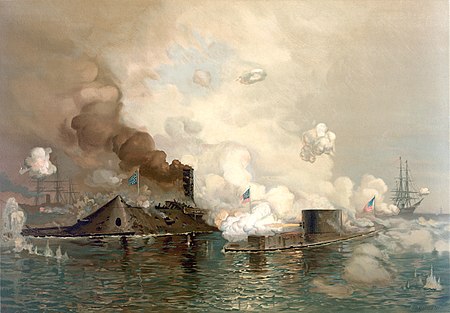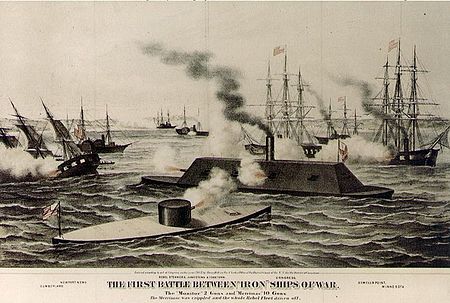 |
| USS Monitor |
But both ships had their disadvantages. The Virginia had not brought solid shot, only exploding shells. While shells were good for wooden ships, they did not do much against the Monitor's iron sides. The Monitor's pilot house had been put in a bad position. The captain was severely wounded when a shell exploded outside the opening while he was looking out.
The battle continued for several hours, with no serious damage being done on either side. The Virginia's ram was broken, but they tried to get alongside to board, hoping their larger crew would carry the day, but the more maneuverable did not let the ships come together. At one point the Virginia ran aground, but they were able to get it afloat again. Although neither ship was being destroyed, it was a hard fight for the men inside their iron sides. The blood ran from their ears from the pounding of the shots on the side and the noise of their cannon firing, and inside the Monitor the boltheads were knocked loose and flew around inside.
At one point Lt. Jones of the Virginia came down to the guns and saw that they were not firing. "Why are not you firing, Mr. Eggleston?" he asked. The officer questioned replied, "Why, our powder is very precious, and after two hours' incessant firing I find I can do here about as much damage by snapping my thumb at here very two minutes and a half." A Federal officer wrote this:
"I triced up the port, ran out the gun, and taking deliberate aim, pulled the lockstring. The Merrimac was quick to reply, returning a rattling broadside (for she had ten guns to our two), and the battle fairly began. The turret and other parts of the ship were heavily struck, but the shots did not penetrate; the tower was intact, and it continued to revolve. A look of confidence passed over the men's faces, and we believed the Merrimac would not repeat the work she had accomplished the day before. The fight continued with the exchange of broadsides as fast as the guns could be served and at very short range, the distance between the vessels frequently being not more than a few yards. Worden skillfully man|uvred his quick-turning vessel, trying to find some vulnerable point in his adversary. Once he made a dash at her stern, hoping to disable her screw, which he thinks he missed by not more than two feet. Our shots ripped the iron of the Merrimac, while the reverberation of her shots against the tower caused anything but a pleasant sensation."Finally, after fighting for six hours, both ships realized that it was useless to continue. They both ended the drawn battle, and went back claiming victory. The Virginia hoped to get solid shot and try again the next day, but the expected rematch never occured. The Monitor never accepted a challenge of single-handed combat, and soon the superior resources of the North built more ironclads to contain the Virginia.
While the battle was a draw, it is clear who were the strategic winners. The Monitor had put a stop to the feared Virginia. No more did the North fear the Virginia sailing to Washington and pounding the government into submission. Never again would a Confederate ironclad have the same chance as the Virginia to completely change the course of the war. Although most of the Union navy was obsolete for naval combat, they could bring their superior resources to bear and build ironclads that could fight anything the South could hope to build.






0 comments:
Post a Comment